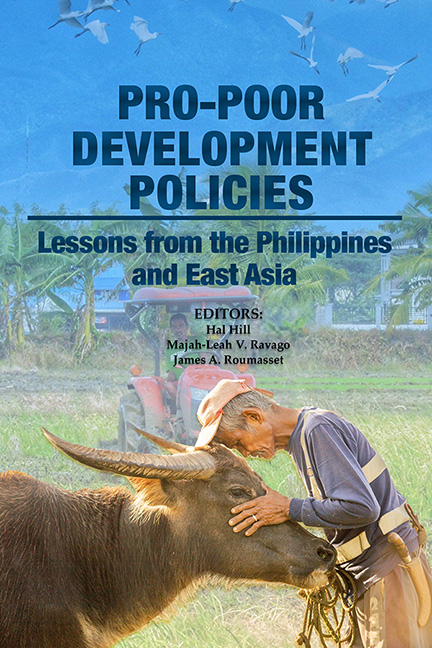Book contents
- Frontmatter
- Dedication
- Contents
- Figures, Tables and Boxes
- Foreword
- Foreword
- Message
- Preface and Acknowledgements
- About the Editors
- About the Contributors
- Acronyms
- Part 1 Introduction and Synthesis
- Part 2 Agricultural and Economic Development
- Part 3 Economic Policies for Achieving Targeted Levels of Living in the Philippines
- Part 4 Inequality and Economic Development
- Part 5 Competition Law and Policy
- Part 6 International Dimensions
- Index
8 - Adapting Philippine Agriculture to Climate Change
Published online by Cambridge University Press: 09 January 2024
- Frontmatter
- Dedication
- Contents
- Figures, Tables and Boxes
- Foreword
- Foreword
- Message
- Preface and Acknowledgements
- About the Editors
- About the Contributors
- Acronyms
- Part 1 Introduction and Synthesis
- Part 2 Agricultural and Economic Development
- Part 3 Economic Policies for Achieving Targeted Levels of Living in the Philippines
- Part 4 Inequality and Economic Development
- Part 5 Competition Law and Policy
- Part 6 International Dimensions
- Index
Summary
INTRODUCTION
Agriculture is an important part of the Philippine economy. Almost a third of the country’s total land area of 30 million hectares was devoted to agriculture in 2015 (PSA 2017). As in other Asian countries, the share of agriculture in the gross domestic product (GDP) has declined with economic development—from 17.3 per cent of GDP in 1980 to 10.2 per cent in 2020. Employment in agriculture has fallen from 51.9 per cent in 1987 to a still high 24.5 per cent in 2020. This underscores agriculture’s continued importance as a source of income for households, especially in the rural areas (World Bank 2018). However, the sector’s annual agricultural productivity growth of 2.87 per cent from 1961 to 2012 has lagged compared with the 3.73 per cent of Indonesia, 4.10 per cent of Malaysia, 3.21 per cent of Thailand, 3.67 per cent of Myanmar and 4.16 per cent of Vietnam (AGRIMAG 2018). The challenges faced by the sector continue to be amplified by the increasing domestic and foreign demand for food due to continued economic growth, rising population and increasing involvement in international trade—amid losses of arable land because of extensive structural changes and urbanization and agriculture’s vulnerability to natural disasters, including climate change. Food insecurity, malnutrition and rural poverty have thus remained issues to be addressed.
Climate change is defined here as medium- and long-term changes in average climate, including temperature and rainfall, as projected by general circulation models. The stress caused by these longer-term changes will further increase the country’s already high vulnerability to climate and weather, including higher frequency and intensity of heatwaves, floods, droughts and typhoons that contribute to land degradation, reduced water availability and increased incidence of climate-sensitive infectious diseases. Climate change can disrupt crop productivity, which, in turn, affects domestic agricultural production, consumption and food security. Such consequences are triggered by both the direct impacts on agricultural production and changes in international prices because of climate change, considering the global nature of the phenomenon, which would then stimulate changes in domestic prices that could adversely affect Philippine agriculture and the country’s overall economy.
- Type
- Chapter
- Information
- Pro-poor Development PoliciesLessons from the Philippines and East Asia, pp. 190 - 220Publisher: ISEAS–Yusof Ishak InstitutePrint publication year: 2022

